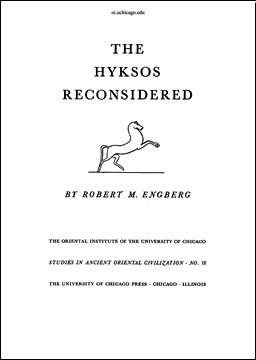SAOC 18. The Hyksos Reconsidered Robert M. Engberg

The material on the Hyksos, both documentary and archaeological, though documented by recent excavations in Palestine and Syria, is still scanty; and the "Hyksos problem" remains one of the chief stumbling blocks with which the historian of the second millennium B.C. has to cope. Mr. Engberg does not pretend to know all the answers, nor has he any startling or revolutionary theories to present. From a cool and eminently sane appraisal of the existing material, plus some bits of newly adduced evidence, he concludes: (1) that the Hyksos were "a cultural force" in the Nile Valley, Syria, and Palestine as early as the middle of the Twelfth Egyptian Dynasty (1900 B.C.); (2) that they entered Egypt "in small and ethnically disparate groups, increasing in number until finally they gained such influence through infiltration, as apparently the Kassites did in Babylonia, that the various elements became a political factor"; (3) that "Hyksos ideas continued to color the life of Egypt well into the Eighteenth Dynasty" and that in Asia "Hyksos blood, modes, and practices entered into the composition of the Canaanites as we see them at the coming of the Hebrews." [From a review by William C. Hayes in the Classical Weekly (February 4, 1940) 159]
- Studies in Ancient Oriental Civilization 18
- Chicago: The University of Chicago Press, 1939
- Pp. xi + 50
- 7.00 x 9.50 in.
- Out of Print

